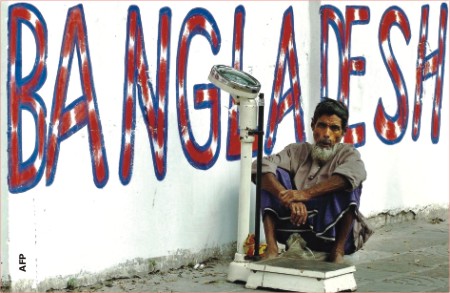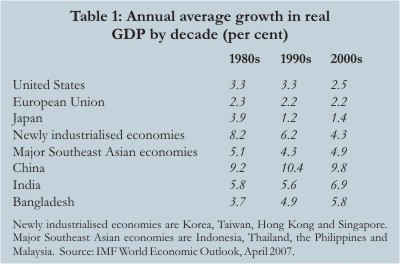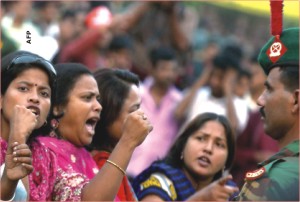
Inside
|
Let's go to the videotape Jyoti Rahman compares the development track records of democracyand dictatorship in Bangladesh In its recently-released annual economic report for Bangladesh, the IMF notes that "the destructive political rivalry of the past three decades, together with weak accountability and rule of law, has squandered a good portion of available resources" and "Bangladesh needs political stability to restore investor confidence." As general principles, one cannot argue with these statements. But quite often, these sentiments morph into a denouncement of political governments and an endorsement of prolonged rule by unelected technocratic regimes. The argument that "democracy is not conducive to economic development" and "a period of disciplined rule is needed" has been doing the rounds among the chattering classes for a while now. Do elected governments perform worse than unelected regimes when it comes to the economy? There is no clear answer to this question. All rich countries, with the possible exceptions of Hong Kong and Singapore are thriving multi-party democracies. But is democracy the cause of development, or its result? Europe had very limited forms of democracy during its development phase in the 19th century. None of the East Asian countries were democracies during their rapid growth era of the 1960s to the 1980s. In most cases, democratic politics followed economic development.
But a lack of democracy is no guarantee for development either. Latin America languished under dictatorships of socialist left and fascist right. The entire continent of Africa slipped into an abyss under undemocratic regimes. Closer to home, India managed to transform its socialist-leaning economy into a dynamic market-oriented one without sacrificing its democracy, while successive military dictatorships have not brought much prosperity to Pakistan. But then again, China's communist dictatorship transformed its socialist economy into a market one, pulling millions out of poverty in the process. It seems that there is no clear link between democracy and development. As a recent World Bank study finds: "Elected governments do not exhibit a systematic advantage in achieving economic development." That is, cross-country data are not going to help us answer the question in the second paragraph. Instead, we need to consider our own experience. So, what has been the experience in Bangladesh? The data on the growth in Bangladesh's real GDP per person are publicly available at the IMF website. This series is adjusted for inflation. That is, this is arguably the simplest and yet most comprehensive measure available about the improvement in living standards over time. Real GDP per person grew by an annual average of 1.3 percent during the 1980s, while the average growth rate under the three post-1990 democratically elected governments was 3.1 percent (Chart 1).
But does this necessarily mean that the elected governments were responsible for the increase in growth rates? The world economic conditions have been strong in recent years -- during the 1990s, we saw the advent of the IT-propelled "new economy" and globalisation; in more recent years, driven by the break-neck pace of growth in China and India, the world economy has been growing at the fastest pace since the 1960s. Could it be that the faster growth in Bangladesh is caused by external factors? On the other hand, during the 1980s, oil prices were low, major economies achieved successful disinflation and carried out structural reforms to their economies, and Asian economies grew very rapidly. And in the 1990s, Japan entered a prolonged slump, Germany coped with reunification, and much of East Asia experienced a major financial crisis. In the current decade, the world economy has been subject to rising prices and major geopolitical tensions. Annual average growth in major economies during each decade would provide a reasonable gauge of the world economic conditions. Table 1 shows this, and suggests that there is no particular reason to believe that the global economic environment, on balance, was particularly less favourable to Bangladesh in the 1980s than during the subsequent decades.
"The higher growth rates were achieved in part because of other liberal policies undertaken by political governments. A free press, private television channels like Channel i, ATN Bangla, and nTV, and the entire telecommunications revolution in Bangladesh made famous by GrameenPhone was spurred during democratic rule. The better flow of information and communication not only generated economic benefits, but also enhanced public consciousness dramatically, allowing the media to raise issues of accountability that we take for granted now." We have thus far considered economic growth, or growth in GDP per person. Real GDP per person is a simple measure of the standard of living. Another such measure is the United Nation's Human Development Indicator (HDI). Bangladesh's HDI was 0.347 in 1975, rising to 0.422 in 1990 and 0.53 in 2004. That is, the post-1990 rise was larger than the rise between 1975 and 1990. That the pace in development was stronger under elected governments than those before 1990 is supported by two other measures: life expectancy at birth and infant mortality rate. According to the World Bank data, life expectancy increased from 47 years in 1977 to 55 years in 1990 -- an annual average rise of 0.1 year. In 2005, life expectancy at birth stood at 64 years -- an annual average rise of 0.6 year since 1990. The same database also shows that infant mortality per thousand live births fell from 142 in 1975 to 100 in 1990 and 54 in 2005.
This is not to say that things couldn't have been better. Living standards have risen at much more rapid paces in India and China than in Bangladesh. Clearly, both our politics and economy could have done without the periodic instability and endemic corruption. The World Bank study cited above notes that elected governments are likely to perform better when they face strong checks and balances, and citizens are relatively better informed. Rather than a period of benevolent dictatorship, our development process will be better assisted by a democracy improved along these lines. Jyoti Rahman is a macroeconomist and a contributor to the Drishtipat Writers' Collective. 1. IMF Article IV Report on Bangladesh, July 2007 (http://www.imf.org/external/pubs/cat/longres.cfm?sk=21170.0). 3. Momen, Facts vs Fads: Democracy and Economic Performance, Progressive Bangladesh, April 2007 (http://www.progressivebangladesh.org/index.php?option=com_content&task=view&id=25&Itemid=35). 4. Details available at http://hdr.undp.org/hdr2006/statistics/about/.
|

 While the IMF data go back to 1980, it is possible to construct an index of real GDP per person from the World Bank data covering the period 1960 to 2005. The annual average growth rate in this series was 1.3 percent between 1973 and 1990, jumping to 2.9 percent in the post-1990 period. That is, regardless of the measure used, it is quite clear that the post-1990 governments presided over faster improvement in living standards in Bangladesh.
While the IMF data go back to 1980, it is possible to construct an index of real GDP per person from the World Bank data covering the period 1960 to 2005. The annual average growth rate in this series was 1.3 percent between 1973 and 1990, jumping to 2.9 percent in the post-1990 period. That is, regardless of the measure used, it is quite clear that the post-1990 governments presided over faster improvement in living standards in Bangladesh. This is not to say that the post-1990 rises in Bangladesh's growth rates were entirely home-grown. Global factors undoubtedly helped. But so did the actions of domestic policymakers. As Dr. Abdul Momen, an economist, notes in an online forum:
This is not to say that the post-1990 rises in Bangladesh's growth rates were entirely home-grown. Global factors undoubtedly helped. But so did the actions of domestic policymakers. As Dr. Abdul Momen, an economist, notes in an online forum:  There appears to be no evidence in the data that democracy has been detrimental to development in Bangladesh, and we should treat blanket statements such as "through the 36 years after independence politicians gave us nothing good" with a grain of salt.
There appears to be no evidence in the data that democracy has been detrimental to development in Bangladesh, and we should treat blanket statements such as "through the 36 years after independence politicians gave us nothing good" with a grain of salt.